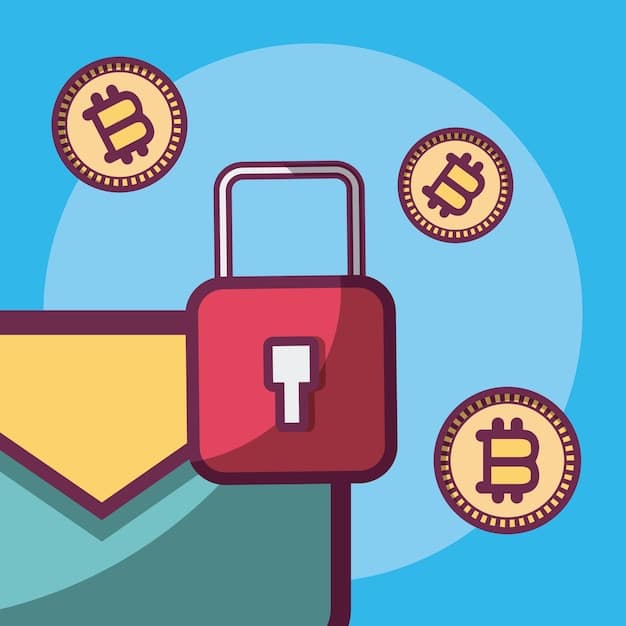Cryptocurrency Scams: Protecting Your Investments in the US

Navigating the cryptocurrency market in the US requires vigilance; understanding common scams, from Ponzi schemes to phishing, is crucial to protect your investments and avoid financial losses.
Investing in cryptocurrencies can be exciting, but it’s also essential to be aware of the risks. The rise of digital currencies has unfortunately led to a surge in scams targeting investors in the US. This article provides actionable insights on cryptocurrency scams to avoid, ensuring your investments are protected in the US market.
Understanding the Landscape of Cryptocurrency Scams in the US
The US cryptocurrency market, while offering opportunities for significant returns, is also a breeding ground for scams. These scams range from simple fraudulent schemes to sophisticated operations that exploit the complexities of blockchain technology. Understanding this landscape is the first step in protecting your investments.
Why Cryptocurrency Scams are Prevalent in the US
Several factors contribute to the proliferation of cryptocurrency scams in the US. The relative novelty of digital currencies, coupled with a lack of comprehensive regulation, creates opportunities for scammers. The anonymity afforded by blockchain technology also makes it difficult to track and prosecute offenders.
- Lack of Regulation: The absence of clear regulatory frameworks makes it challenging to enforce laws against crypto fraud.
- Anonymity: The pseudonymous nature of crypto transactions allows scammers to operate with reduced risk of being identified.
- High Potential Returns: The promise of quick and substantial profits attracts inexperienced investors who are more susceptible to scams.

Being aware of these factors can help you approach the cryptocurrency market with a healthy dose of skepticism and diligence.
Common Types of Cryptocurrency Scams to Watch Out For
Identifying the specific types of scams prevalent in the crypto market is crucial for protecting your investments. Here are some of the most common cryptocurrency scams to watch out for in the US:
Pump and Dump Schemes
Pump and dump schemes involve artificially inflating the price of a cryptocurrency through misleading positive statements, only to sell the inflated assets later for a profit. This leaves other investors with losses when the price inevitably crashes.
Phishing Attacks
Phishing attacks involve scammers posing as legitimate entities to trick you into revealing sensitive information such as private keys or login credentials. These attacks often come in the form of emails, messages, or fake websites that closely resemble real platforms.
To avoid falling victim to these scams, always double-check the sender’s email address, avoid clicking on suspicious links, and never share your private keys or passwords with anyone.
Identifying Red Flags: How to Spot a Cryptocurrency Scam
While scammers are becoming increasingly sophisticated, there are still red flags that can help you identify potential scams. Recognizing these warning signs can save you from significant financial losses.
Unrealistic Promises and Guarantees
Be wary of any cryptocurrency investment that promises unrealistically high returns or guarantees profits. Legitimate investments always carry some level of risk, and any offer that seems too good to be true probably is.
Lack of Transparency and Information
Scammers often avoid providing clear and detailed information about the project or the team behind it. Look for transparency regarding the cryptocurrency’s purpose, technology, and development plans.
- No Whitepaper: Check for a comprehensive whitepaper that outlines the project’s goals, technology, and roadmap.
- Anonymous Team: Be cautious if the team members are not publicly known or have limited online presence.
- Unclear Funding: Scrutinize how the project is funded and whether the financial information is transparent.
Always do your own research and seek independent opinions before investing in any cryptocurrency.
Best Practices for Protecting Your Cryptocurrency Investments in the US
Protecting your cryptocurrency investments requires a combination of diligence, caution, and the adoption of best practices. Here are some essential steps to safeguard your assets in the US market.
Use Strong and Unique Passwords
Ensure your passwords are strong, unique, and not easily guessable. Use a combination of uppercase and lowercase letters, numbers, and symbols. Avoid reusing passwords across multiple platforms.
Enable Two-Factor Authentication (2FA)
Two-factor authentication adds an extra layer of security by requiring a second verification method, such as a code sent to your phone or generated by an authenticator app. This makes it much harder for scammers to access your accounts.

Implementing these security measures significantly reduces your risk of falling victim to cryptocurrency scams.
Legal Recourse for Cryptocurrency Scam Victims in the US
If you have fallen victim to a cryptocurrency scam, it’s essential to know your legal options and how to report the fraud. While recovering lost funds can be challenging, taking the right steps can improve your chances of getting justice.
Reporting the Scam to Relevant Authorities
Report the scam to the Federal Trade Commission (FTC) and the Securities and Exchange Commission (SEC), as well as to your local law enforcement agencies. Providing as much detail as possible can help them investigate and potentially recover stolen assets.
Seeking Legal Counsel
Consult with an attorney who specializes in cryptocurrency law. They can advise you on your legal options and help you navigate the complex legal landscape. Legal counsel can also assist in gathering evidence and pursuing legal action against the scammers.
Taking prompt action can improve your chances of recovering your funds and holding the scammers accountable.
Staying Informed and Educated About Cryptocurrency Risks
The cryptocurrency market is constantly evolving, and new scams are emerging all the time. Staying informed and educated about the latest risks is crucial for protecting your investments in the long term.
Following Reputable News Sources and Industry Experts
Keep up with the latest developments in the cryptocurrency world by following reputable news sources, industry experts, and regulatory updates. This will help you stay ahead of emerging threats and make informed investment decisions.
Participating in Online Communities and Forums
Engage with online communities and forums where investors share their experiences and insights. These platforms can provide valuable information about potential scams and help you learn from the mistakes of others.
By staying informed and proactive, you can navigate the cryptocurrency market with confidence and protect your investments from fraud.
| Key Point | Brief Description |
|---|---|
| ⚠️ Scam Types | Recognize pump and dumps, phishing, and Ponzi schemes. |
| 🚩 Red Flags | Be wary of guaranteed returns and lack of transparency. |
| 🛡️ Security | Use strong passwords and enable 2FA for protection. |
| 法律 Legal Steps | Report scams to the FTC/SEC and seek legal advice. |
FAQ
▼
Common scams include pump and dump schemes, phishing attacks, Ponzi schemes, and fake ICOs. Each of these exploits vulnerabilities in the market or investor behavior.
▼
Look for red flags such as guaranteed high returns, lack of transparency, anonymous teams, and pressure to invest quickly. Verify all information independently.
▼
Report the scam to the FTC, SEC, and local law enforcement. Gather all relevant information and consult with a legal professional specializing in cryptocurrency law.
▼
Use strong, unique passwords, enable two-factor authentication (2FA), and store your cryptocurrencies in secure wallets. Be cautious of phishing attempts.
▼
Follow reputable news sources, industry experts, and regulatory websites. Engage with online communities and forums, but always verify the information.
Conclusion
Protecting your cryptocurrency investments in the US requires vigilance, education, and proactive security measures. By understanding the common types of scams, recognizing red flags, and following best practices, you can mitigate the risks and safeguard your assets in the dynamic world of digital currencies.





